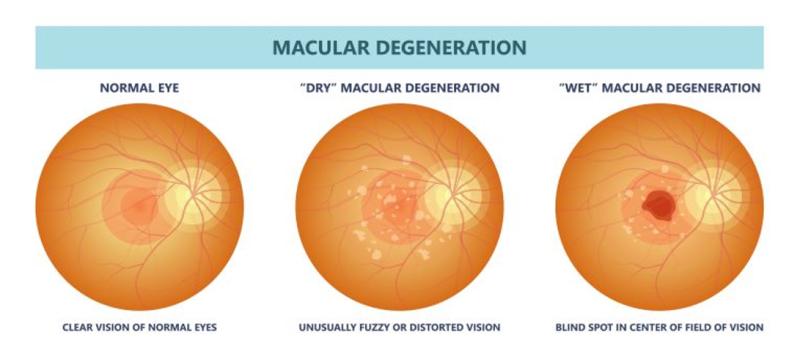Wet Age-Related Macular Degeneration - Understanding and Managing It

Wet age-related macular degeneration (AMD) is a serious condition affecting the macula, the part of the retina responsible for central vision. Understanding who it affects, the risk factors, and the available treatments are crucial for managing this condition effectively.
Let’s begin.
What is Wet Age-Related Macular Degeneration?
Wet age-related macular degeneration (AMD) is an advanced form of AMD that occurs when abnormal blood vessels grow under the retina and macula. These blood vessels often leak blood and fluid, causing rapid damage to the macula. If not promptly treated by a retina specialist, this form of macular degeneration can lead to severe vision loss.
Who is Affected?
Primarily, wet AMD affects individuals over the age of 50. However, age is not the only risk factor. Genetics, smoking, high blood pressure, and obesity also increase the likelihood of developing this condition. Individuals with a family history of macular degeneration should be particularly vigilant.
Risk Factors
Several risk factors contribute to the development of wet AMD.
● Age is the most significant factor, with the condition becoming more common as people enter their 60s and 70s.
● Genetics also plays a critical role; having a relative with AMD increases the risk.
● Lifestyle choices like smoking can double the chances of developing wet AMD.
● Uncontrolled high blood pressure and obesity further exacerbate the risk.
How Common is Wet AMD?
Wet AMD is less common than its counterpart, dry AMD, but it accounts for most of the severe vision loss associated with macular degeneration. The condition's prevalence has increased with longer life expectancies and an aging population, making awareness and early detection more critical than ever.
Treatment Options
- Anti-VEGF Injections: When it comes to treatment, time is of the essence. The primary treatment for wet AMD involves intravitreal injections, which deliver medication directly into the eye to halt the growth of abnormal blood vessels. Several types of injections are available, such as ranibizumab, aflibercept, and bevacizumab.
These are the most common and effective treatments. Anti-VEGF (vascular endothelial growth factor) drugs block the signals that cause abnormal blood vessels to grow. They are the mainstay of treatment.
These injections need to be administered regularly, often monthly, to maintain their effectiveness. Delaying treatment can lead to permanent vision damage, so it is necessary to follow the treatment schedule recommended by a retina specialist.
- Photodynamic Therapy: This involves injecting a light-sensitive drug into the bloodstream, which is then activated by a laser to destroy abnormal blood vessels.
Why Regular Treatment is Important
Regular intravitreal injections are vital because they prevent further damage to the macula. Missing or delaying appointments can allow the abnormal blood vessels to proliferate and cause more harm. Early and consistent treatment is the best defence against the progression of wet AMD.
The Final Take Away
Wet age-related macular degeneration is a serious condition that requires timely and ongoing treatment. Individuals over 50, those with a family history of macular degeneration, or those with other risk factors should schedule regular check-ups with an eye specialist in Delhi. With proper care and prompt treatment, wet AMD can be managed effectively to maintain better vision quality. Early detection and adherence to the treatment plan are crucial in combating this condition.
If you have any symptoms or need further guidance, consulting with retina specialists can provide the most up-to-date and effective treatment options. Staying proactive about eye health and keeping regular appointments are essential to safeguarding vision.
Get the Right Treatment with Dr. Anisha Gupta
For expert care and personalized treatment plans for wet age-related macular degeneration, schedule a consultation with Dr. Anisha Gupta, one of the leading eye specialists in Delhi. With extensive experience in treating retinal conditions, Dr. Gupta offers comprehensive care to help manage and treat macular degeneration effectively.
Don't wait until it's too late—book your appointment today and take the first step towards preserving your vision.
Watch this video for more info:
Age-Related Macular Degeneration (AMD): Types,Causes, Symptoms,Treatment | Dr Anisha Gupta, at Delhi
Post Your Ad Here
Comments